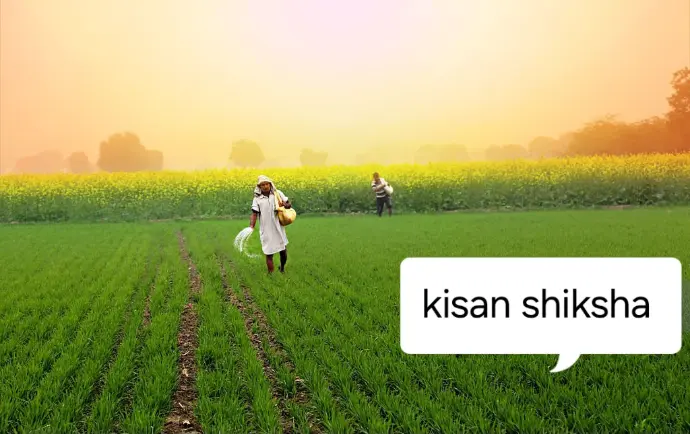Services
Latest workshops

Crop Management Techniques
Crop management includes seed selection, planting time, soil care, irrigation, management of weeds, pests and diseases, and harvesting. Modern crop management also involves precision agriculture techniques, such as drones and satellite imaging , which help farmers monitor crops and accurately identify problems.

1. Knowledge of Agricultural Techniques – Farmers should be educated about advanced farming methods, proper use of seeds, fertilizers, and pesticides.

Crop Health Management
Techniques Involved in Crop Management:
Seeds and Planting:
Selecting high quality seeds and ensuring proper planting depth and timing.
Soil care:
Maintaining soil fertility, improving soil health, and ensuring proper irrigation.
Irrigation:
To use water judiciously as per crop requirements and to reduce wastage of water.
Weed, Pest and Disease Management:
Using appropriate techniques to control weeds, pests and diseases, such as biological control and chemical control.
Crop rotation:
Maintaining soil fertility and controlling pests and diseases by rotating crops.
Harvesting and Storage:
Harvesting the crop at the right time and storing it properly so that the quality can be maintained.
Precision Agriculture:
Monitoring crops and accurately identifying problems using drones and satellite imaging.
Kisan health education
1. Importance of a Healthy Body: A healthy body is essential for performing farming tasks efficiently and increasing productivity.
2. Cleanliness and Personal Hygiene: Washing hands, cutting nails, bathing regularly, and wearing clean clothes help prevent diseases.
3. Balanced Diet: Farmers should consume a diet that includes grains, pulses, vegetables, fruits, milk, and other nutrients for good health.
4. Safe Drinking Water: Drinking clean and purified water prevents waterborne diseases. Boiling or filtering water is recommended.
5. Avoid Addiction: Stay away from alcohol, tobacco, and other harmful substances to maintain physical and mental well-being.
6. Disease Awareness and First Aid: Farmers should know about common illnesses and basic first aid practices.
7. Vaccination and Regular Health Check-ups: Ensure timely vaccinations for all family members and go for routine health check-ups at least once a year.
8. Safe Use of Pesticides: While spraying pesticides, use protective gear like masks and gloves to avoid exposure to harmful chemicals.
9. Mental Health: Staying connected with family and community and managing stress is important for mental health.
10. Use of Health Services: Take advantage of government health services such as Primary Health Centers and schemes like Ayushman Bharat.
1. When and what kind of food should farmers eat?
Farmers do physically demanding work, so they need nutritious and energy-rich food to stay healthy and strong.
Kisan Yog Class – Key Points:
1. Introduction:
The purpose of Kisan Yog Classes is to improve the physical and mental well-being of farmers.
Yoga helps reduce stress and boosts energy levels.
2. Importance of Yoga for Farmers:
Despite physical labor, farmers often suffer from body pain and fatigue due to improper posture.
Yoga strengthens muscles and relieves pain.
It enhances mental peace and concentration, leading to better decision-making.
3. Useful Yoga Asanas for Farmers:
Tadasana (Mountain Pose): Helps improve body balance and posture.
Bhujangasana (Cobra Pose): Relieves back pain and strengthens the spine.
Vajrasana (Thunderbolt Pose): Aids in digestion and relaxes the body.
Shavasana (Corpse Pose): Provides deep relaxation and relieves fatigue.
Pranayama (Anulom-Vilom, Bhramari): Improves respiratory system and calms the mind.
4. Features of the Class:
Free or low-cost sessions for farmers.
Yoga instructors are sent to rural areas.
Group practice encourages motivation and regularity.
5. Benefits:
Better physical and mental health.
Reduced medical expenses.
Increased efficiency and enthusiasm in farming work.
Kisan Salahkar (Farmer Advisor) – Key Points:
1. Introduction:
A Kisan Salahkar is an important representative of the Agriculture Department.
Their role is to guide farmers with scientific methods, crop protection, and government schemes.
2. Roles and Responsibilities:
Providing timely technical advice on crop production.
Giving information on pests, diseases, and weather updates.
Advising on the proper use of seeds, fertilizers, and pesticides.
Organizing agricultural fairs, training sessions, and camps.
Spreading awareness about subsidies and government support schemes.
3. Importance:
Bridges the gap between farmers and modern agricultural practices.
Helps improve crop quality and productivity.
Supports income growth for farmers.
All Services free
1. Kisan Free Online Education
2. Providing life information to the farmer
3. Kisan Yoga
4. Farmer Health
5. Farmers food and water
6. Farmer Advisor
7. Farmers take care of the soil
8. Farmers save water
9. Kisan Seed Information
10. Information regarding pesticides for farmers.
11. Kisan Fertilizer Information
12. Farmer's crop disease information
13. Information about timely watering of the field
14. Providing information to the farmer about the right time of sowing seeds in the field.
15. Providing information about government schemes to farmers
16. Soil analysis
17. Check crop disease by sending photos
18. Crop price information
19. Making farmers self-reliant
20. The farmer learned to grow vegetables for his family
21. Farmers should plough their fields on time, give information about this
22. All farmers should learn to be friendly and hardworking
23. Learn to cook
24. Save trees, save earth
25. Save the animals
26. Indoor gardening
27. Air pollution information
28. Android App
29. Free home delivery
30. meditation
31. House Money
32. home gardening
Note point
1. w.f=1₹
2. r.c=1₹
3. a.m.c=1₹
4. t.m.c=1₹
5. f.m.c=1₹
6. g.s.t=0₹








